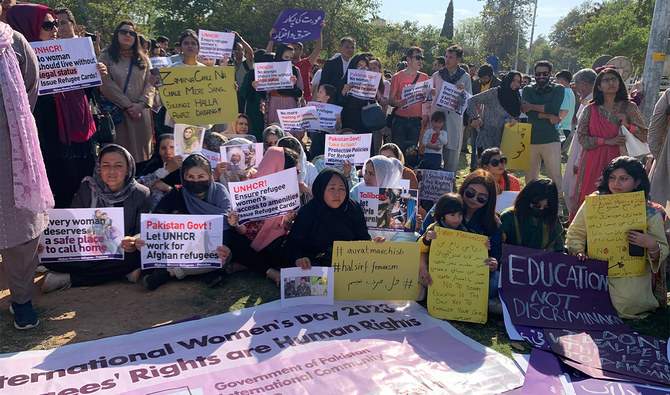ISLAMABAD: Pakistani police are investigating officers after violence at a march to mark International Women's Day in Islamabad, a spokesman said Thursday. Three constables have been suspended from duty for misusing their authority.
Hundreds of people gathered in a central area of the city to mark the occasion on Wednesday, amid tight security. Organizers said the event was aimed at seeking rights guaranteed by the Constitution. Some conservative groups last year threatened to stop similar marches by force.
The demonstrators faced strong resistance from police, who charged at them with batons as they tried to enter the rally area, which was blocked off by shipping containers.
“The constables involved in the baton charge have been suspended from their duties on charges of misuse of authority,” Islamabad police spokesman Taqi Jawad said.
There was no official order to use force against rally-goers, and the officers involved in the violence “acted in the heat of the moment,” he said.
The inspector general of Islamabad Police, Akbar Nasir Khan, has ordered an inquiry into three constables and there is an investigation to see if more officers were involved in the violence. A report will be submitted in the coming days, according to Jawad.
Islamabad police apologized Wednesday to the women’s march protesters for the "unacceptable use of violence." It said police stood in solidarity with the rally participants and their struggle for the protection of women’s rights.
Academic and gender studies expert Dr. Farzana Bari, one of the protest’s main organizers, condemned the violence.
She suffered scratches to the face and a ligament injury to the hand after being pushed by police onto barbed wire.
She said officers failed to protect women on the internationally observed day.
“Police baton-charged us and two transgender people who suffered injuries were shifted to hospital due to bleeding,” she told The Associated Press. “The police earlier issued us warnings to call off the march in view of the possible attacks by religious fanatics, however (they) indulged in violence themselves.”
In the eastern city of Lahore, Punjab Police on Wednesday registered a case against former Prime Minister Imran Khan’s political party after one of his supporters died at a rally. The case is based on a complaint about the death.
Police used water cannons and fired tear gas to disperse Khan’s supporters, with more than 40 arrested for defying a government ban on holding rallies in the city.
Khan’s Pakistan Tehreek-e-Insaf party, or PTI, blamed the police for the death of its activist in the security crackdown near the former premier’s house in an upscale part of Lahore.
A spokesman for Punjab police Agha Ehtesham denied Thursday that officers were responsible for the death. He blamed the casualty on stone-throwing protesters.
The inspector general of Punjab Police, Dr. Usman Anwar, has set up an inquiry committee to investigate the matter, said Ehtesham.
















